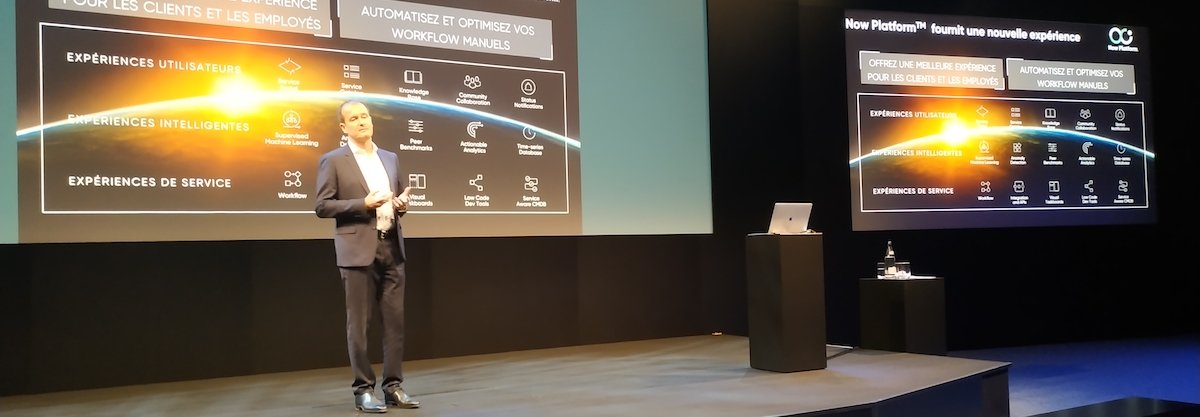
ServiceNow is diversifying. The ITSM leader is now clearly a competitor to PeopleDoc, NeoCase and Workday on the one hand, and Salesforce and ZenDesk on the other.
French CTO Matthieu de Montvallon explained in the third part of this interview that the concept of a platform (overused elsewhere) and the concept of “horizontal” services are the core of this strategy.
Business App Studio and developer tools
LeMagIT: Today, in addition to your IT and security history, you also target human resources and customer service. You also provide development tools. What do they do?
Matthieu de Montvallon: effective, This is what we call Business Apps. The goal is to enable a professional (not a “citizen developer” of IT) to meet their needs by building their solutions on our platform, either because it has a specific specialty or because we don’t. It is not provided as a standard. This interests more and more customers, because ultimately it is the industry that understands their needs best.
LeMagIT: How do you develop ServiceNow business applications?
Matthieu de Montvallon: For Studio, this is a low-code tool. And, if you want to get rid of the simple logic of a staged process with complex portals or different interfaces, you can perform scripting (NDR: JavaScript).
LeMagIT: Who is using your low-code tools?
Matthieu de Montvallon: There are two situations. Customers who use this tool directly with us-in France, very few. Those who have already established centers of excellence on ServiceNow can easily switch afterwards. There are many.
“Real Platform” Strategy
LeMagIT: ServiceNow’s strategy does not seem to involve acquisitions, at least less than other US IT players (such as Salesforce). Can you explain this strategy to us?
Matthieu de Montvallon: We buy less, it’s true, but we still buy back…not in the same way.
LeMagIT: What is that?
Matthieu de Montvallon: We acquire two or three companies every year and only use intellectual property (IP), knowledge and technology. Small businesses will always fill in the gaps we may have. They allow us to innovate faster to fill them.
I insist every time, we are “re-platform”. Compared with many of our competitors, there is a big difference. Below the application, we maintain the same technology and an unknowable single workflow engine. I can say that it is in the platform, in the foundation, and not in the application. What makes true end-to-end possible. It is not just an integration between several tools.
The result is that every time you redeem, you have to wait 6 months to a year to benefit from it, because it must be re-platformed. For example, Parlo (NDR, purchased in May 2018) will launch a new version in 2019.
LeMagIT: Any DataViz tool is a platform. Even Uber is a platform… Isn’t the term “platform” meaningless?
Matthieu de Montvallon: Yes! Everything becomes a “platform”. Therefore, when we tell our customers that we are a real platform, our customers sometimes find it difficult to understand. “Yes, but how do you become a real platform?”. The example I often use is an end-to-end workflow that relies on a single data model.
LeMagIT: One of the novelties I quote from London is that Greater integration capabilities. Does this mean that although ServiceNow is positioned as a horizontal platform, it does not have all the connectors and all the APIs to connect to all systems?
Matthieu de Montvallon: No, we no longer have all connectors with all functions. We will never own them. Otherwise it would be too presumptuous. We also have no standard connector logic. This is different from other orchestration tools that have a connector library and strive to get as many competing processes as possible, but if your tool does not exist, you will run into a lot of trouble.
Instead, we have an open connector logic. We provide connection logic, which are “templates” that allow for tailoring and permanent retention of connectors. And adapt to them later.
The new thing you are talking about “Integration Center” is a new way of organizing these connectors and integrations. This is not more or better integration, but a way to manage them in one place.
future
LeMagIT: What are the next technological developments and challenges for ServiceNow?
Matthieu de Montvallon: Natural language-so Parlo was acquired. We are working hard. Our president also sees the future of AI with autonomous systems and services.
Another challenge will be to move towards a new career.
LeMagIT: Which one?
Matthieu de Montvallon: You will see! (Bright smile) Always attack the “core business” with the same logic instead of attacking users. And with our platform concept.
#Development #tools #horizontal #platform
More from Source